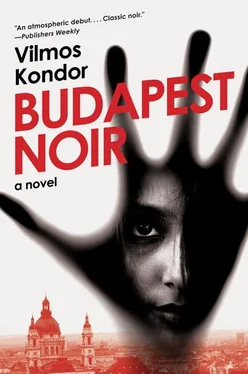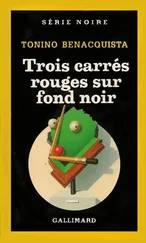The trail was lit up for a while by the light from the lodge. Krisztina took Gordon’s arm, and slowly they walked ahead. They were in no hurry; there was nowhere to go and no reason to do so. Krisztina began recounting the story she’d heard from Teréz Ökrös. Incredulity lurked in her voice throughout, as if she didn’t understand a single word, even though she knew it was so.
“Fanny was a polite, lovely, lively little girl. She was born in the first year of the World War, which is when her father started traveling frequently to Africa. Maybe not by chance, at least that’s how Teréz sees it. He wanted a son by all means, but his wife had such a difficult delivery that the doctors said they couldn’t have any more children. Szőllősy bore a grudge against both his wife and daughter. Not that he let them know exactly, but he did grow cold toward them; and while perhaps he needn’t have traveled so much, there was no more simple and obvious reason to be away from his family. The girl adored not only her mother but also Teréz, who raised her—she was her wet nurse, after all. Teréz entered service with the Szőllősys after giving birth to a son at the age of eighteen. Fanny studied diligently under the tutelage of young English ladies. Never did she suffer for want of anything. She feared only her own father’s cold, standoffish demeanor. She attended church regularly with her mother, and everything else was in order with her.” Krisztina stopped by a fallen tree and sat down on it before resuming. “Her father decided where she would continue her studies. He sent her to the technical university in Berlin. But Fanny, who wanted to be an artist, came home and confronted her father. If he would let her go to Paris, to the Sorbonne, she would study whatever he wanted her to afterward. Business, accounting, anything at all—but what she wanted to do now was to paint. Szőllősy fell into a violent rage but eventually, under pressure from his wife, gave in.
“For three years Fanny studied painting in Paris, coming home only in the summers and for Christmas. But this spring, in the middle of the academic semester, she suddenly showed up at home, confronted her father once again, and told him she was getting married. There were no secrets Teréz didn’t know about. What she didn’t hear during the regular bouts of shouting between father and daughter, Fanny filled her in on.”
Krisztina paused, and Gordon waited silently for more. “It turned out that while in Paris, Fanny had met the son of a Budapest Hassidic rabbi. They fell in love, but to marry him she had to convert to Judaism. Szőllősy said it was out of the question. What if his German partners found out? Word would get out that he, too, was Jewish, and then he could say good-bye to doing business in Germany. Besides, being Jewish even in Hungary wasn’t exactly good luck. He’d give her hand in marriage to a Protestant before he ever would a Jew. Fanny said she didn’t give a damn about the Germans and didn’t give a damn about business—she wanted to marry Shlomo and marry him she would. At that, her father asked: Didn’t she see what was going on here? What was going on in Nuremberg? If word got out about their ancestry, they’d be done for. And if Fanny converted to Judaism, word would surely get out. Fanny repeated that she didn’t give a damn, that she would marry the boy. She’d convert. If you see him one more time, her father told her, you are no longer my daughter. Teréz didn’t hear the rest—she was so scared that she went downstairs to clean the cellar.”
Krisztina shook her head before continuing. “A half hour later Teréz was just coming up out of the cellar when she happened to notice Fanny with a suitcase in her hand. She looked at Teréz, who saw amid the tears in Fanny’s eyes a determination she’d never seen there before. From that day on, Szőllősy’s wife hadn’t said a word to her husband. A couple days later, Szőllősy had Fanny’s belongings and her furniture packed away; he had the room painted over and a piano put inside; and he became more gruff than ever before.” Krisztina fell silent.
“What happened then?” asked Gordon.
“Not much,” she replied. “Teréz figures Szőllősy’s wife met with her daughter several times, but she doesn’t know for sure. The woman never did speak in confidence with Teréz, who nonetheless suspects that she must have met with Fanny. On more than one occasion she suddenly got dressed and went out the door, though before, she’d always told Teréz where she was headed. Now she spoke only in general terms—she was off to the coffeehouse, to go shopping, to an exhibit. And on getting home, Szőllősy’s wife would sit about for a long time in the living room, drinking wine—sometimes a whole bottle—and staring straight ahead while puffing a cigarette, even though she’d quit back in 1925.”
“And why did Teréz have to leave?”
“Two weeks ago, Szőllősy summoned her, gave her two weeks’ pay—this, after serving the family for more than twenty years—and sent her packing immediately. Teréz came straight home, and since that day she hasn’t heard a thing about either Fanny or the Szőllősys.”
“That’s all she said?”
“That’s it.”
“I understand.”
“Well, I don’t understand, Zsigmond!” said Krisztina, springing up off the log. “You’re always saying ‘I understand, I understand.’ What the hell do you understand about all this? Because I don’t understand a thing. Not a thing in the whole damn world!”
With that, Krisztina headed toward the lookout. Gordon stood up and hurried after her. Putting his arm around her, he turned her toward the hunting lodge. “It’s too dark out. It’ll be better back there where it’s warm. You wouldn’t see anything from the lookout, anyway.”
Krisztina let Gordon lead her back. She slipped her arm through his, and thus they made their way back to the lights of the lodge.
Back inside, the smell of supper struck Krisztina’s nose. She shuddered. “Do you have an appetite?”
“I do,” replied Gordon. “You’ll have one, too, you’ll see. We’ll sit down here by the fireplace, order a bottle of wine, have a nice quiet supper, and then we can talk back at the hotel, if you want.”
Bársony peered out from the kitchen and reappeared a couple of minutes later with the tray. “A li-li-little something to f-f-fire up the a-a-appetite before supper,” he said, placing another round of shot glasses on the table. Gordon took only a taste, but Krisztina gulped down the grape-skin brandy at once. “Bring a bottle of red wine, too, if you have one,” she said, looking at the hunter. Bársony nodded and went back to the kitchen. Gordon helped Krisztina slip off her coat, then pulled out a chair for her. Czövek sat at the corner table, watching them in silence, a cigarette in his mouth. Gordon cast him a look that made it clear he was not to disturb them just now.
Bársony placed the venison roast and potato dumplings on the table in front of Krisztina, along with a little dish of blueberry jam. Gordon got a majolica plate containing the flank of wild boar and the fried salted potatoes. And, finally, Czövek received his bowl of bean soup with wild boar. Bársony must have sensed something, too; instead of returning to the kitchen, he sat down at an adjacent table and got to talking with them. At first, Gordon was angry at the intrusion, but then he realized that Krisztina was distinctly enjoying the hunter’s vivid stories, which were laced with biting wit. As for the wine, it stirred Krisztina’s appetite into action: she devoured the venison as if she were seeing food for the first time in days. Gordon was listening to Bársony with gratitude; and Krisztina was not only eating but drinking, too. By the time they’d finished, only a cupful of wine splashed about at the bottom of the bottle. Krisztina’s eyes kept closing. Gordon asked for the bill and he paid. Bársony accompanied them out to the car.
Читать дальше
Конец ознакомительного отрывка
Купить книгу












